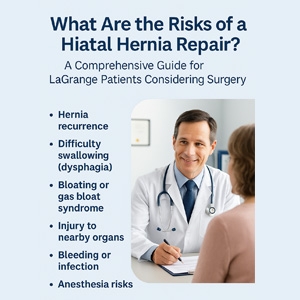What Are the Risks of a Hiatal Hernia Repair?
A Comprehensive Guide for LaGrange Patients Considering Surgery
If you’ve been diagnosed with a hiatal hernia or suffer from chronic acid reflux (GERD), your doctor may have recommended a surgical repair — especially if medications aren’t helping or symptoms are worsening. For many patients in LaGrange, IL, this leads to the next important question:
“What are the risks of a hiatal hernia repair?”
Dr. Jihad Kudsi, a board-certified general and bariatric surgeon with expertise in robotic and minimally invasive surgery, provides personalized care for patients considering foregut procedures such as hiatal hernia repair.
What Is a Hiatal Hernia?
A hiatal hernia occurs when part of the stomach pushes through the diaphragm into the chest. This condition often causes:
- Chronic heartburn (GERD)
- Chest pain
- Difficulty swallowing
- Regurgitation or belching
- Breathing issues in larger hernias
While small hernias may not require treatment, larger or symptomatic hiatal hernias (especially paraesophageal hernias) often benefit from surgical repair.
Common Surgical Approach: Laparoscopic or Robotic Repair
Most hiatal hernias are repaired using minimally invasive techniques such as laparoscopic or robot-assisted surgery. These techniques allow for:
- Smaller incisions
- Less pain
- Faster recovery
- Shorter hospital stay (often same-day or 1-night)
What Are the Risks of Hiatal Hernia Repair?
Though hiatal hernia repair is generally safe, like any surgical procedure, it carries some risks. Understanding these helps patients make an informed decision and know what to watch for postoperatively.
1. Hernia Recurrence
- Occurs in a small percentage of cases.
- Risk is higher in large hernias or if lifestyle changes (e.g., weight loss) aren’t followed post-surgery.
2. Difficulty Swallowing (Dysphagia)
- Common in the first few weeks post-op due to swelling.
- Rarely, persistent dysphagia may require dilation or adjustment.
3. Bloating or Gas Bloat Syndrome
- Some patients feel bloated or have trouble burping initially.
- Usually resolves with time and dietary adjustments.
4. Injury to Nearby Organs
- Rare, but potential injury to the esophagus, spleen, or stomach can occur.
- Risk minimized with experienced surgeons like Dr. Kudsi, who specializes in robotic techniques.
5. Bleeding or Infection
- Minimal with laparoscopic surgery but always a possibility with any procedure.
6. Anesthesia Risks
- Includes nausea, allergic reaction, or breathing issues in rare cases.
- All patients are carefully screened and monitored preoperatively.
Why Choose Dr. Kudsi in LaGrange?
Dr. Jihad Kudsi is a double board-certified surgeon in general surgery and bariatric surgery. He offers expertise in foregut conditions like hiatal hernias and GERD — providing not only safe surgical care, but also long-term guidance for recovery and prevention.
Patients trust Dr. Kudsi for:
- Robotic & minimally invasive techniques
- Bariatric expertise in complex cases
- Telehealth consults and in-person follow-ups
- Personalized aftercare, including diet, medication, and activity planning
Serving LaGrange and Surrounding Communities
If you're searching for hiatal hernia repair near LaGrange, or wondering whether surgery is worth the risk, you're not alone. Dr. Kudsi’s patients come from:
- LaGrange
- Oak Brook
- Hinsdale
- Downers Grove
- Western Springs
- Burr Ridge
- Westchester
Frequently Asked Questions
Q: Is hiatal hernia surgery worth the risk?
A: For patients with severe GERD, regurgitation, or strangulated hernias, surgery is often life-changing and reduces the need for chronic medications.
Q: How long is the recovery time?
A: Most patients return to light activity within 7–10 days and normal routines in 3–4 weeks. Dietary changes are required for the first few weeks post-op.
Q: Can I get hernia repair and weight loss surgery together?
A: Yes. If clinically appropriate, Dr. Kudsi can perform combined procedures, such as hiatal hernia repair and sleeve gastrectomy, especially for patients with obesity-related GERD.
Q: Will I need mesh?
A: In large hernias, mesh reinforcement may be used to reduce recurrence. Dr. Kudsi will discuss this during your consultation.
Book Your Consultation with Dr. Kudsi
If you're experiencing heartburn, chest discomfort, or regurgitation and suspect a hiatal hernia, don’t delay care. The risks of leaving a large hernia untreated can be more serious than surgery — including organ strangulation or esophageal damage.
Schedule Your Appointment:
For in-person or Duly Health patients
Book through Duly Health and Care:
https://www.dulyhealthandcare.com/physicians/jihad-kudsi-md
For direct appointment booking in LaGrange
https://doctorkudsi.setmore.com/
Don’t live with the discomfort or risk of an untreated hernia.
Let Dr. Kudsi and his expert team in LaGrange guide you through your options and help you breathe — and eat — easier again.




